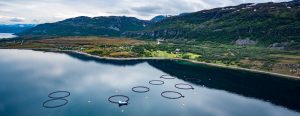 BRITISH COLUMBIA – A new peer-reviewed Science Response Report published on the Department of Fisheries and Oceans Canada’s (DFO) website by the Canadian Science Advisory Secretariat (CSAS) concludes that sea lice on farm-raised salmon does not impact sea lice levels on wild juvenile salmon in British Columbia.
BRITISH COLUMBIA – A new peer-reviewed Science Response Report published on the Department of Fisheries and Oceans Canada’s (DFO) website by the Canadian Science Advisory Secretariat (CSAS) concludes that sea lice on farm-raised salmon does not impact sea lice levels on wild juvenile salmon in British Columbia.
This comprehensive CSAS report adds to the nine previous CSAS science reviews (2020) on salmon aquaculture in BC, that concluded “minimal risk” to Fraser River Sockeye salmon from all relevant fish pathogens of concern. The current report indicates that there is no statistical correlation between sea lice counts on wild and farmed populations of salmon – meaning that the presence of farmed salmon does not appear to have a measurable impact of sea lice counts on wild salmon populations.
Sea lice naturally occur in the Pacific Ocean, and farm-raised salmon enter the ocean free of sea lice. The BC Salmon Farmers, under DFO stringent regulations, diligently practice precautionary management measures to minimize sea lice transmission from farmed to wild salmon.
Through innovation, the sector has continuously improved management practices to reduce the risk of sea lice interactions between wild and farmed salmon populations. This includes focused integrated pest management with a suite of treatment tools. This latest science review is a confirmation that the hard work is paying off.
“As a sector, we continue to improve and innovate to ensure that our operations have minimal impact on the surrounding ecosystem,” says Brian Kingzett, Executive Director of the BC Salmon Farmers Association (BCSFA). “As farmers, and as British Columbians, we care about wild salmon and agree whole heartedly with DFO Minister Joyce Murray regarding ensuring the protection of wild Pacific salmon.”
BC Salmon Farmers are committed to the continuation of monitoring sea lice on wild salmon in all operating areas as a condition of federal licensing for Atlantic salmon farms. The sector will continually strive through innovation and Indigenous oversight to lower sea lice levels on farms and build on the results reflected in this recent CSAS review, to show that farmed and wild salmon can coexist sustainably.
The BC Salmon Farmers are currently working with DFO on the federal mandate to progressively minimize or eliminate interactions with wild salmon. BCSFA’s new report titled: “BC Salmon Aquaculture Transition: Then & Now” details how First Nations right to self-determination and reconciliation will lead the way to a successful transition plan for salmon farming in British Columbia. The report also outlines how the sector’s deep history of innovation supports the federal government’s vision for BC aquaculture, reconciliation, food security, the blue economy, and climate-friendly protein production.
The CSAS Science Response Report results from the National Peer Review process on the association between sea lice from Atlantic salmon farms, and sea lice infestation on juvenile wild Pacific Salmon in British Columbia held on June 24, 2022.
Find the full CSAS Science Response Report here: READ HERE


